大一下期末英语翻译
全新版大学英语课后翻译(大一下)
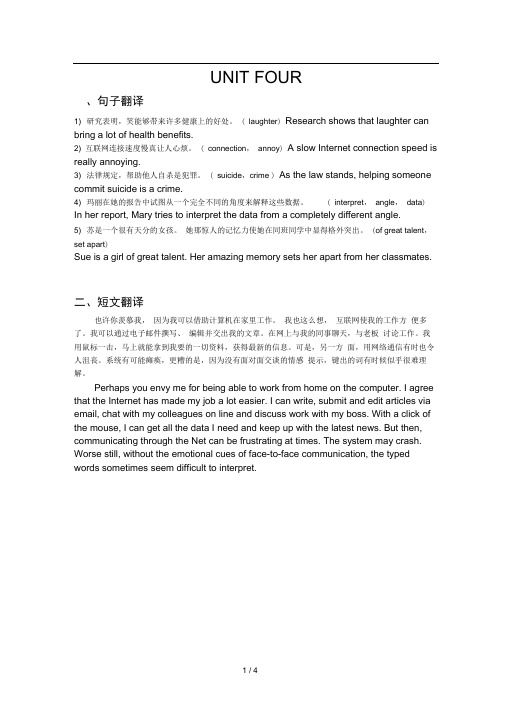
、句子翻译1) 研究表明,笑能够带来许多健康上的好处。
( laughter) Research shows that laughter can bring a lot of health benefits.2) 互联网连接速度慢真让人心烦。
( connection,annoy) A slow Internet connection speed is really annoying.3) 法律规定,帮助他人自杀是犯罪。
( suicide,crime ) As the law stands, helping someone commit suicide is a crime.4) 玛丽在她的报告中试图从一个完全不同的角度来解释这些数据。
( interpret,angle,data) In her report, Mary tries to interpret the data from a completely different angle.5) 苏是一个很有天分的女孩。
她那惊人的记忆力使她在同班同学中显得格外突出。
(of great talent,set apart)Sue is a girl of great talent. Her amazing memory sets her apart from her classmates.二、短文翻译也许你羡慕我,因为我可以借助计算机在家里工作。
我也这么想,互联网使我的工作方便多了。
我可以通过电子邮件撰写、编辑并交出我的文章。
在网上与我的同事聊天,与老板讨论工作。
我用鼠标一击,马上就能拿到我要的一切资料,获得最新的信息。
可是,另一方面,用网络通信有时也令人沮丧。
系统有可能瘫痪,更糟的是,因为没有面对面交谈的情感提示,键出的词有时候似乎很难理解。
Perhaps you envy me for being able to work from home on the computer. I agree that the Internet has made my job a lot easier. I can write, submit and edit articles via email, chat with my colleagues on line and discuss work with my boss. With a click of the mouse, I can get all the data I need and keep up with the latest news. But then, communicating through the Net can be frustrating at times. The system may crash. Worse still, without the emotional cues of face-to-face communication, the typed words sometimes seem difficult to interpret.、句子翻译1)是工人和主管人员的创造力和敬业精神将这个公司变成了一个盈利的企业。
大一英语下学期课后翻译
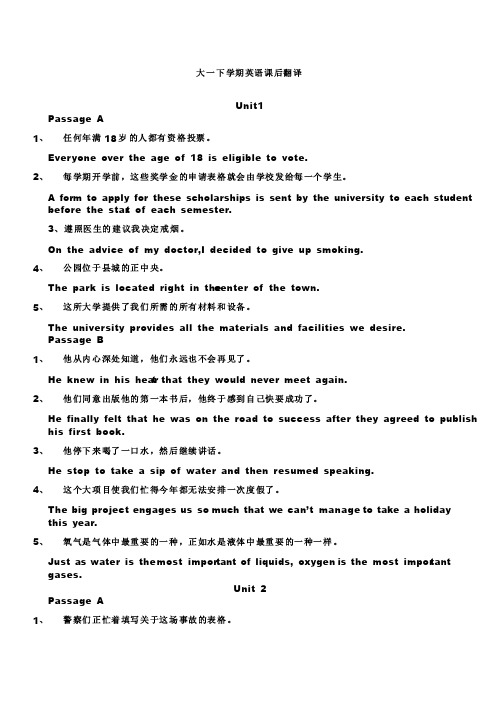
大一下学语期英语课课后翻译Unit1Passage A1、 任何年满18岁的人都有资格投票。
Everyone over the age of 18 is eligible to vote.2、 每学期开学前,这些奖学金的申请表格就会由学校发给每一个学生。
for A form m to apply for these scholarships is sent by the university to each student before the star t of each semester.3、遵照医生的建议我决定戒烟。
On the advice of my doctor,I decided to give up smoking.4、 公园位于县城的正中央。
The park is located right in the center of the town.5、 这所大学提供了我们所需的所有材料和设备。
The university provides all the materials and facilities we desire.Passage B1、 他从内心深处知他道,他们们永远也不会再见了。
He knew in his hear t that they would never meet again.2、 他们同意出版他的第一本书后,他终于感到自己快要成功了。
He finally felt that he was on the road to success after they agreed to publish his first book.3、 他停下来喝了一口水,然后讲继续讲话话。
He stop to take a sip of water and then resumed speaking.4、 这个大项目使我们忙得今年都无法安排一次度假了。
The big project project engages engages engages us so us so much much that we can can’’manage t manage to to take a holiday this year.5、 氧气是气体中最重要的一种,正如水是液体中最重要的一种一样。
(完整word版)翻译(大一下学期)

Unit7汉译英1. 警察放大了失踪女孩的照片,这样他们能容易认出她.(Use ”have + object + V-ed" structure) The police had the photograph of the missing girl enlarged so that they could recognize her easily.2. 我喜欢乘公共汽车上班,而不是自己驾车。
那天上午也不例外.(rather than, no exception)When I go to work, I prefer to take a bus rather than drive and that morning was no exception. 3。
这位老人见到自己的孙女走进屋时站了起来,竟意想不到地移动了几步,就好像他能行走了似的.(get to one's feet, as if)When he saw his granddaughter coming into the house (Seeing his granddaughter coming into the house),the old man got to his feet and moved several steps unexpectedly as if he could walk by himself。
4. 当时我们的注意力全集中在那幅画上,没有注意到四周有什么异样情况,所以也不能提供任何额外的细节。
(focus on, additional details)At that time we focused our attention on that painting without noticing anything unusual around us, and we can't offer any additional details.5。
大一期末考试英语重点单词
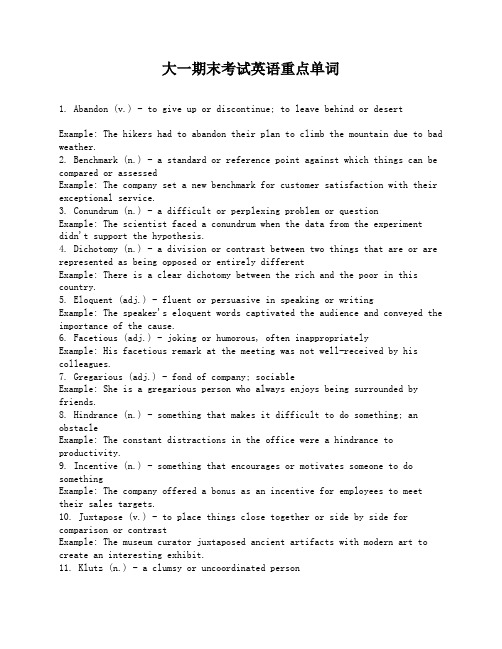
大一期末考试英语重点单词1. Abandon (v.) - to give up or discontinue; to leave behind or desertExample: The hikers had to abandon their plan to climb the mountain due to bad weather.2. Benchmark (n.) - a standard or reference point against which things can be compared or assessedExample: The company set a new benchmark for customer satisfaction with their exceptional service.3. Conundrum (n.) - a difficult or perplexing problem or questionExample: The scientist faced a conundrum when the data from the experiment didn't support the hypothesis.4. Dichotomy (n.) - a division or contrast between two things that are or are represented as being opposed or entirely differentExample: There is a clear dichotomy between the rich and the poor in this country.5. Eloquent (adj.) - fluent or persuasive in speaking or writingExample: The speaker's eloquent words captivated the audience and conveyed the importance of the cause.6. Facetious (adj.) - joking or humorous, often inappropriatelyExample: His facetious remark at the meeting was not well-received by his colleagues.7. Gregarious (adj.) - fond of company; sociableExample: She is a gregarious person who always enjoys being surrounded by friends.8. Hindrance (n.) - something that makes it difficult to do something; an obstacleExample: The constant distractions in the office were a hindrance to productivity.9. Incentive (n.) - something that encourages or motivates someone to do somethingExample: The company offered a bonus as an incentive for employees to meet their sales targets.10. Juxtapose (v.) - to place things close together or side by side for comparison or contrastExample: The museum curator juxtaposed ancient artifacts with modern art to create an interesting exhibit.11. Klutz (n.) - a clumsy or uncoordinated personExample: He's such a klutz that he can't even walk down the street without tripping.12. Lethargic (adj.) - feeling a lack of energy and motivation; sluggish Example: The hot summer day made everyone feel lethargic and unmotivated. 13. Melancholy (adj.) - a feeling of sadness and longingExample: The old photograph evoke a sense of melancholy in her as she remembered her childhood.14. Nonchalant (adj.) - calm and relaxed, even in situations where others might be excited or worriedExample: He remained nonchalant in the face of the approaching deadline.15. Oblivious (adj.) - not aware of or not noticing something, often because one is thinking about something else or is absent-mindedExample: She was so engrossed in her book that she was oblivious to the world around her.16. Prodigious (adj.) - surprisingly large or great; amazingExample: The athlete's prodigious talent made him a star in the sports world.17. Quandary (n.) - a state of uncertainty or confusionExample: The politician found himself in a quandary when deciding how to handle the crisis.18. Resilient (adj.) - able to withstand or recover quickly from difficult conditionsExample: Despite facing many challenges, she remained resilient and continued to pursue her dreams.19. Stoic (adj.) - calm and unemotional, especially in situations of pain or troubleExample: He maintained a stoic demeanor even in the face of adversity.20. Ubiquitous (adj.) - present or found everywhereExample: Smartphones have become an ubiquitous part of modern life.21. Vivacious (adj.) - lively and full of energyExample: Her vivacious personality made her the life of the party.22. Whimsical (adj.) - characterized by capricious or unpredictable behavior Example: The artist's whimsical style made her paintings unique and captivating.23. Xenophobia (n.) - a deep dislike of people from other countries Example: The rise of xenophobia in recent years has been a concern for many.24. Yolk (n.) - the yellow part of an egg, containing most of the egg's nutrientsExample: She carefully separated the egg white from the yolk for the cake recipe.25. Zeal (n.) - great enthusiasm for somethingExample: His zeal for learning new languages led him to become fluent in five different languages.26. Aesthetic (adj.) - concerned with beauty or the appreciation of beautyExample: The decorator chose a color palette with great aesthetic appeal for the room.27. Benevolent (adj.) - kindly and generousExample: The benevolent philanthropist donated a large sum to the charity.28. Chicanery (n.) - the use of deceitful or unfair methods to achieve somethingExample: The lawyer was accused of chicanery in the courtroom.29. Didactic (adj.) - intended to teach or instruct, often morallyExample: The novel had a didactic message about the importance of honesty.30. Egregious (adj.) - outstandingly bad or shockingExample: The company's egregious pollution of the river led to heavy fines.31. Facile (adj.) - easily achieved or understood; not requiring much effortExample: The solution to the problem was not as facile as it first appeared.32. Gregarious (adj.) - fond of company; sociableExample: She is a gregarious person who always enjoys being surrounded by friends.33. Hubris (n.) - excessive pride or self-confidenceExample: His hubris led him to believe that he could not fail.34. Intransigent (adj.) - unwilling to compromise or changeExample: The intransigent politician refused to consider any alternative proposals.35. Jovial (adj.) - cheerful and friendlyExample: The jovial host made sure that everyone at the party had a good time.36. Knotty (adj.) - complicated or difficult to solveExample: The knotty problem required a lot of thought to solve.37. Languid (adj.) - slow and relaxed; lacking energyExample: The languid summer day passed by without anything happening.38. Meticulous (adj.) - extremely careful and preciseExample: The meticulous researcher checked every detail of the experiment.39. Nonplussed (adj.) - puzzled or confusedExample: The unexpected question nonplussed the speaker for a moment.40. Onerous (adj.) - involving a great deal of effort or difficultyExample: The onerous task of cleaning the entire house took all day.41. Perfidious (adj.) - deceitful and untrustworthyExample: The perfidious friend betrayed his companions without a second thought.42. Quibble (v.) - to argue about small, unimportant detailsExample: They spent hours quibbling about the exact wording of the contract.43. Resilient (adj.) - able to withstand or recover quickly from difficult conditionsExample: Despite facing many challenges, she remained resilient and continued to pursue her dreams.44. Stoic (adj.) - calm and unemotional, especially in situations of pain or troubleExample: He maintained a stoic demeanor even in the face of adversity.45. Ubiquitous (adj.) - present or found everywhereExample: Smartphones have become an ubiquitous part of modern life.46. Vivacious (adj.) - lively and full of energyExample: Her vivacious personality made her the life of the party.47. Whimsical (adj.) - characterized by capricious or unpredictable behaviorExample: The artist's whimsical style made her paintings unique and captivating.48. Xenophobia (n.) - a deep dislike of people from other countriesExample: The rise of xenophobia in recent years has been a concern for many.49. Yoke (n.) - a wooden bar or frame by which two animals (such as oxen) are joined together for workingExample: The farmer attached the yoke to the oxen before plowing the field.50. Zealous (adj.) - showing great enthusiasm for somethingExample: He was zealous in his support for the environmental protection cause.。
大一下期末英语翻译
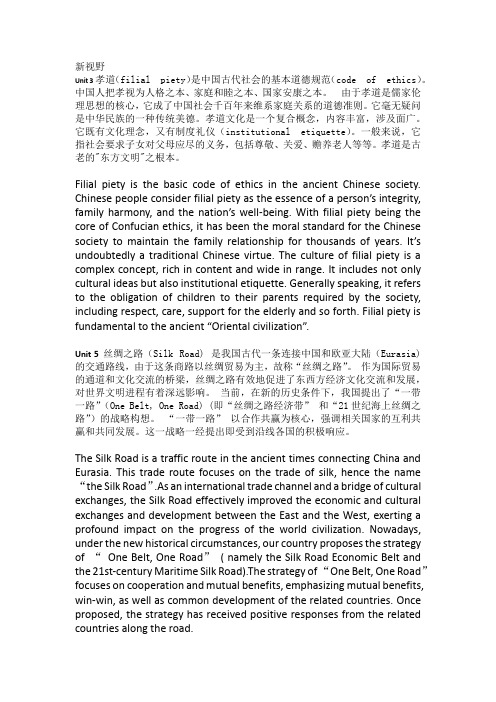
新视野Unit3孝道(filial piety)是中国古代社会的基本道德规范(code of ethics)。
中国人把孝视为人格之本、家庭和睦之本、国家安康之本。
由于孝道是儒家伦理思想的核心,它成了中国社会千百年来维系家庭关系的道德准则。
它毫无疑问是中华民族的一种传统美德。
孝道文化是一个复合概念,内容丰富,涉及面广。
它既有文化理念,又有制度礼仪(institutional etiquette)。
一般来说,它指社会要求子女对父母应尽的义务,包括尊敬、关爱、赡养老人等等。
孝道是古老的"东方文明"之根本。
Filial piety is the basic code of ethics in the ancient Chinese society. Chinese people consider filial piety as the essence of a person’s integrity, family harmony, and the nation’s well-being. With filial piety being the core of Confucian ethics, it has been the moral standard for the Chinese society to maintain the family relationship for thousands of years. It’s undoubtedly a traditional Chinese virtue. The culture of filial piety is a complex concept, rich in content and wide in range. It includes not only cultural ideas but also institutional etiquette. Generally speaking, it refers to the obligation of children to their parents required by the society, including respect, care, support for the elderly and so forth. Filial piety is fundamental to the a ncient “Oriental civilization”.Unit 5 丝绸之路(Silk Road) 是我国古代一条连接中国和欧亚大陆(Eurasia) 的交通路线,由于这条商路以丝绸贸易为主,故称“丝绸之路”。
大一下学期英语期末考试必备中英文翻译题(长歌).docx

大一下学期英语期末考试必备中英翻译题制作人:长歌(在校生)QQ:3269666921.The award should be enough to cover his tuition fees.A 这笔奖金应该够支付他的学费了。
B 这奖励应该足够覆盖他的学费了。
C 应该讲给他足够的钱去付学费。
参考答案: A2.I find it hard to cook by myself.A 我发现它很难去自己烹饪。
B 我感到自己做饭很困难。
C 我很难得自己去做饭。
参考答案: B3.He was unable to get used to the new environment.A 他无法适应新的环境。
B 他没有能力在新环境中使用。
C 他没有能力去习惯新环境。
参考答案: A4.Different people have different opinions about the gap year.A 人们对间隔年有着不同的看法B 不同的的人有着不同的观点C 不同的人对间隔年有不同的看法参考答案: C1. Taking plenty of exercise would do you good.A 做足够的练习对你有好处B 多锻炼身体对你有好处C 从事足够的锻炼对你好。
参考答案: B2.Amy wants to live off campus because she cannot get along well with her roommates.A 艾米想离开学校,因为她不能和室友相处。
B 艾米想住在校外因为她不能和室友交流。
C 艾米想在学校外面住,因为她无法与室友相处。
参考答案: C3.Now I can walk to work instead of driving.A 现在我可以步行去上班,而不必开车了。
B 现在我可以走着去工作开车。
C 现在我可以开车去上班。
参考答案: A4.Mary is really grateful for your timely help.A 玛丽真的伟大能及时帮忙。
大一下学期基英期末翻译题总结
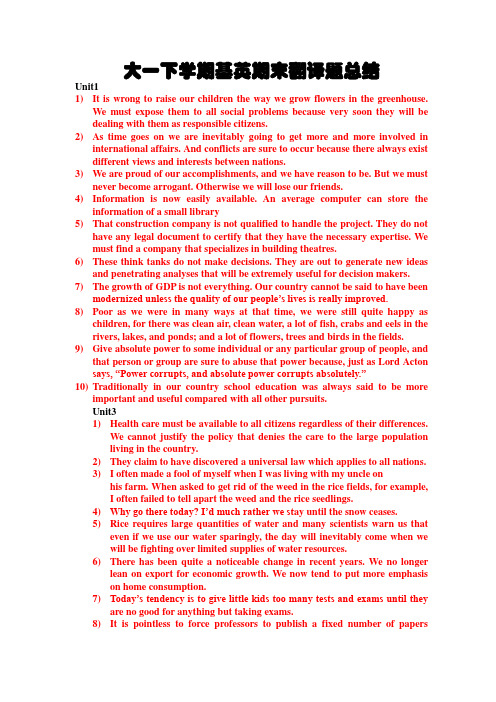
大一下学期基英期末翻译题总结Unit11) It is wrong to raise our children the way we grow flowers in the greenhouse.We must expose them to all social problems because very soon they will be dealing with them as responsible citizens.2) As time goes on we are inevitably going to get more and more involved ininternational affairs. And conflicts are sure to occur because there always exist different views and interests between nations.3) We are proud of our accomplishments, and we have reason to be. But we mustnever become arrogant. Otherwise we will lose our friends.4) Information is now easily available. An average computer can store theinformation of a small library5) That construction company is not qualified to handle the project. They do nothave any legal document to certify that they have the necessary expertise. We must find a company that specializes in building theatres.6) These think tanks do not make decisions. They are out to generate new ideasand penetrating analyses that will be extremely useful for decision makers. 7) The growth of GDP is not everything. Our country cannot be said to have beenmodernized unless the quality of our people’s lives is really improved.8) Poor as we were in many ways at that time, we were still quite happy aschildren, for there was clean air, clean water, a lot of fish, crabs and eels in the rivers, lakes, and ponds; and a lot of flowers, trees and birds in the fields.9) Give absolute power to some individual or any particular group of people, andthat person or group are sure to abuse that power because, just as Lord Acton says, “Power corrupts, and absolute power corrupts absolutely.”10) Traditionally in our country school education was always said to be moreimportant and useful compared with all other pursuits.Unit31) Health care must be available to all citizens regardless of their differences.We cannot justify the policy that denies the care to the large population living in the country.2) They claim to have discovered a universal law which applies to all nations.3) I often made a fool of myself when I was living with my uncle onhis farm. When asked to get rid of the weed in the rice fields, for example,I often failed to tell apart the weed and the rice seedlings.4) Why go there today? I’d much rather we st ay until the snow ceases.5) Rice requires large quantities of water and many scientists warn us thateven if we use our water sparingly, the day will inevitably come when we will be fighting over limited supplies of water resources.6) There has been quite a noticeable change in recent years. We no longerlean on export for economic growth. We now tend to put more emphasis on home consumption.7) Today’s tendency is to give little kids too many tests and exams until theyare no good for anything but taking exams.8) It is pointless to force professors to publish a fixed number of papersannually regardless of their quality. Besides, this is a demand even Einstein would not have been able to meet.Unit41)The fact that he was able to avoid the seemingly inevitable crash madehim a national hero.2)Of the four students who risked their lives to try to drag the drowningchildren to shore, two never returned.3)The Japanese are known for their long life span. They believe they owethis to their eating habits/composition of their diet, which contains a lot of fish products.4)I know Harris. I couldn’t imagine a man like him making such stupidremarks.5)After testing her loyalty many times, he was now going to give her themost dangerous task.6)I hear that Lincoln delivered an extremely powerful speech on thatoccasion. Whatever did he actually say?7)That this time they must be ready to challenge death was clear toeverybody. But no one regretted this move.8)As accidents go/As far as accidents are concerned, there was nothingout of the ordinary: a crazy young man drives a car on a university campus and kills a young woman student. What is unusual is the fact that the man dares to challenge the people who want to take him to court because his father is a local police officer.9)Every time/Whenever we decide on a financial policy, we have to makea clear distinction between short-term interests and long-term interests.10)Although it was early October, people could already be seen drivingacross the frozen river.Unit51)The government will have to decide when and how to put brakes on the economy before it speeds out of control.2)Why waste money building an airport in the middle of nowhere? We must not ignore the fact that what people here need most is clean water and clean air.3)They thought they might take a different route on their return trip so as to explore the great canyon in Tibet.4)She traveled around the world and came back home quite a changed person, educated and greatly revitalized.5)There is no easy fix for our social problems. We should explore all possibilities and move one step at a time.6)All old traditions die a slow and lingering death. Customs and habits that have taken so long to form can’t be expected to disappear overnight. 7)Madam Chang was considered a pioneer who advocated combining classic Chinese music with Western music.8)I was so stunned when I heard the news, that for quite some time I didn’t know what to say.9)The soldiers are learning how to survive in the wilderness.10)I’ll go there with you if you insist. But really I won’t be much help to you.Unit81) If it hadn’t been for one man’s courage and wisdom, the Shenzhen Special Economic Zone could never have succeeded. This man was the first mayor of the city.2) ---- Sorry I cut you off just now. You were saying…---- I was saying that it is not easy to break down the resistance of those conservatives. But we must go at them step by step.3) The government knows only too well that it cannot increase taxes atwill without hurting home consumption. But to shift the emphasisfrom export to domestic consumption takes time.4) Even with all these home appliances, it is impossible to do away with/ eliminate our domestic labor completely.5) Our town must have looked this way three hundred years ago. Manyold buildings were about to fall in ruins. Some of our leaders wanted to tear them down and put up new tall buildings in their place. But due to lack of money, the plan had to be abandoned. Looking back that was actually a blessing. Today our town has become a tourist attraction.6) Ironically, sometimes, the more we increase production, the more wedecrease profit.7) This project has occupied too much of my time. I could not launch anew project even if I wanted to.8) To tell the truth, I’m more worried about social stagn ation thaneconomic slowdown. Of course, you may not share my view.9) Sadly enough, not everyone realizes that if we do not improve oureducational standards, we will lag behind other countries for ever.Unit9`1)Mr. Lin has always concerned himself with the desertification problem. Ifully agree with him that this is a serious concern as regards our environment protection.2)The spokesman of our government expressed our deep concern for thetwo Chinese engineers who were recently taken hostage by the pirates.3)It is hard to visualize how we can protect the dam from enemy attack.4)Freedom of religion means not only that people can pursue differentfaiths. It also means that they have the right not to have any religion.5)We teachers usually meet once every week to compare notes about ourteaching.6)The situation of this area is very delicate. No country should be allowedto do anything to threaten the precarious balance.7)To be adequate as a translator, we must have a good command of boththe foreign language and Chinese. And I consider myself terribly inadequate in this respect.8)However we differ in our opinion, we must face the challenge together.9)The way I define a good education is that, when you get through it, younot only know how to make a living, but you also know how to live.。
大一下英语、英语课后翻译

第一单元翻译:1. In life our stupidiest course of action is to cling too much to what we have and refuse to let go.2. I'm willing to work in the IT industry, but have no idea how to go about it.3. Many people are aware of the importance of living in harmony with nature.4. Problems like the generation gap cannot be swept under the carpet.5. I never did understand what was eating away at her.6. He has been at peace with the world all his life.7. He did not speak out/say what he thought. For one thing, she might not understand. For another, he was afraid that she might not forgive him.8. As the years rooled by, he became increasingly interested in /fascinated Chinese culture第二单元P581) Such a sight always moves me and sets me thinking.2) Stop scolding/blaming her—you’d have done the same thing under/in similar circumstances.3)We should be appreciative of/grateful for what we have instead of taking everything for granted.4) He may promise to change, but it’s the same old story of saying one thing and doing another.5) I racked my brains about how to break the terrible news to him.6) It will be impossible for me to repay my parents for everything they have done for me.7) For now, it reminds to me to thank you once more for joining us and wish you good luck in your work.8) I said right from the beginning that he would cause us trouble.第三单元P931) Rumor has it that his new book is based on a true story about a family in a small Tennessee town.2) He teaches in a middle school, but he does some translation work on the side to bring extra cash/money.3) It’s good to be confident (about your self), but there is a difference between confidence and conceit.4) Only those who stick it out can achieve success. Those who give up halfway will never realize their dreams.5) A true hero possesses/has courage, a noble purpose and a willingness to make sacrifices.6) Anyone who picked up this novel and reads the first paragraph will be hard pressed to put it down.7) In a sense, life is like swimming; if you keep holding on to the sides of the pool, you (will) never learn.8) The future of a nation depends in a large measure upon the quality of education and training. 第四单元P1241) Only those who have lived through a similarexperience can fully appreciate this.(The only people who can fully appreciate this arethose who have lived through a similar experience.) 2) Scientists have been hard pressed to figure out howthese particles form and interact (with one another). 3) I’d like to express my special thanks to everyone whohas contributed over the years in one way or another.4) The individual success of the employees in a teamenvironment results in success for the company.5) The war, although successful in military terms, leftthe economy almost in ruins.6) He decided to channel his energies into somethinguseful, instead of being glued to the TV set all daylong.(He decided to channel his energies into somethinguseful, instead of sitting in front of the TV set all daylong.)7) There’s a difference between strength and courage. Ittakes strength to survive. It takes courage to live.8) She was by nature a very affectionate person, alwaysready to give a helping hand to others.第七单元1.We have worked together for a long time and have never let our differing opinions get in the way of our friendship.2.This agreement will pave the way for a lasting peace between the two countries.3.They usually don’t mention their requirements unt il you are beginning to let your defenses down.4.You should have the courage for face your own mistakes. Don’t try to shift the blame onto others when things go wrong.5. If you are more often than not affected by fear and worry, you will find this book very useful.6.Now that I have accepted the position, I shall certainly do to the best of my ability all that is required of me.7.If you don’t have a plan of what you will do every day, chances are high that you won’t do much.8. Great minds think alike. Your ideas are completely in line with his.。
《原创》大一下学期期末考试英语知识点整理

《原创》大一下学期期末考试英语知识点整理翻译:(1——4单元)1. Their argument ended when she slammed the door and left without a word.她砰的关上门,一声不吭的走了,他们之间那场争执就此结束。
2.The guests at the dinner party were slightly surprised at the commanding tone of the American.出席晚宴的客人对那个美国人威严的语气感到意外3. Johnny has outgrown the fear of staying at home alone.约翰尼已经长大成熟,不再害怕独自呆在家里。
4. While all the other passengers made for the exit, he alone remained in his seat as if unwilling to leave the plane.当全部乘客都向出口处走去时,他却独自留在座位上,好像不愿意离开这架飞机似的。
5.The letter is to be handed to Dr. Wilson himself.这封信必须交给威尔逊博士本人。
6.While she felt like joining in the argument, Nancy was too shy to open her mouth.南希虽然很想参加辩论,但腼腆的不敢开口。
7.What do you think is the likeliest time to find him at home?你觉得什么时候最有肯能在家里找到他?8.The hunter’s face lit up with excitement as soo n as he saw a fox emerge from among the bushes and make for the trap he had laid.猎人一看有只狐狸从树丛中出现并向他设下的陷阱方向跑去,脸上顿时显出了兴奋的表情。
三明学院大一(下)大学英语期末英汉互译

三明学院大一(下)大学英语期末英汉互译一、英译汉1)The idea that learning should take place by continu al careful shaping and molding applies equally to t he arts. ( Unit 1)学习应通过不间断的精心塑造与引导而得以实现,这一观念同样适用于艺术。
2)But the critical point was that, in the process, w e were trying to teach Benjamin that one can solve a problem effectively by oneself. (Unit 1)但关键在于,在这个过程中,我们试图让本杰明懂得,一个人是能够很好地自行解决问题的。
3)When I write a beautiful line of poetry, or fabric ate a joke that tickles someone, I feel rich insid e. (unit 2 )当我写出美丽的诗句或编造出能把人逗乐的笑话时我内心感到很富有。
4)Yet I feel nothing more than a passing whim to attain the material things so many other people have. ( unit 2 )然而,想要得到其他那么多人都有的物质的东西,对我来说,只不过是转瞬即逝的念头而已。
5)I’d never thought I relied so much on co-workers for company. I beg an to understand why long-term unemployment can be so damagin g. (unit 4 )以前我从未想过自己会那么依赖同事做伴。
英语大一期末考试重点单词
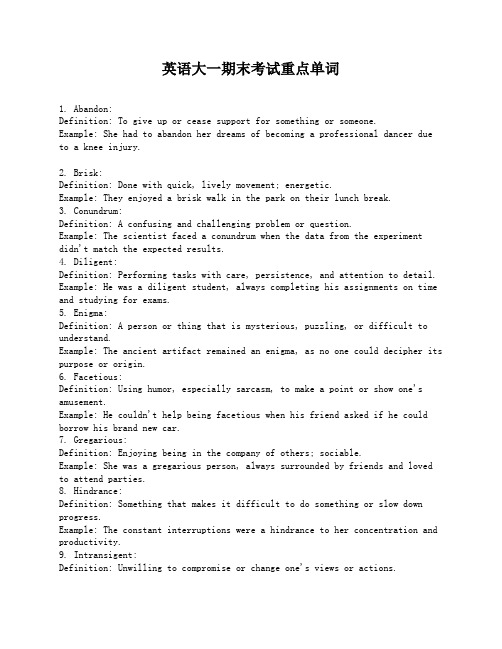
英语大一期末考试重点单词1. Abandon:Definition: To give up or cease support for something or someone.Example: She had to abandon her dreams of becoming a professional dancer due to a knee injury.2. Brisk:Definition: Done with quick, lively movement; energetic.Example: They enjoyed a brisk walk in the park on their lunch break.3. Conundrum:Definition: A confusing and challenging problem or question.Example: The scientist faced a conundrum when the data from the experiment didn't match the expected results.4. Diligent:Definition: Performing tasks with care, persistence, and attention to detail. Example: He was a diligent student, always completing his assignments on time and studying for exams.5. Enigma:Definition: A person or thing that is mysterious, puzzling, or difficult to understand.Example: The ancient artifact remained an enigma, as no one could decipher its purpose or origin.6. Facetious:Definition: Using humor, especially sarcasm, to make a point or show one's amusement.Example: He couldn't help being facetious when his friend asked if he could borrow his brand new car.7. Gregarious:Definition: Enjoying being in the company of others; sociable.Example: She was a gregarious person, always surrounded by friends and loved to attend parties.8. Hindrance:Definition: Something that makes it difficult to do something or slow down progress.Example: The constant interruptions were a hindrance to her concentration and productivity.9. Intransigent:Definition: Unwilling to compromise or change one's views or actions.Example: The union and management remained intransigent during the negotiations, making it difficult to reach an agreement.10. Juxtaposition:Definition: The act of placing two things close together or side by side for comparison or contrast.Example: The juxtaposition of the old and new buildings highlighted the contrast between traditional and modern architecture.11. Klutzy:Definition: Clumsy or awkward in movements or actions.Example: He felt klutzy on the dance floor, constantly stepping on hispartner's toes.12. Lethargic:Definition: Feeling a lack of energy or motivation; sluggish.Example: After the long night, she felt lethargic and struggled to get out of bed.13. Mellifluous:Definition: Sweet-sounding; pleasant to the ears.Example: The singer's mellifluous voice captivated the audience during the concert.14. Nefarious:Definition: Wicked,罪恶的; evil.Example: The nefarious plans of the villain were thwarted by the superhero. 15. Oblivious:Definition: Unaware or unconscious of something, often to the point of disregard.Example: He was so oblivious to his surroundings that he didn't notice the pouring rain until he was completely soaked.16. Perseverance:Definition: Steadfastness in doing something despite difficulty or delay in achieving success.Example: Her perseverance paid off when she finally graduated with a degree in engineering.17. Quandary:Definition: A state of uncertainty or dilemma; a difficult situation. Example: The politician found himself in a quandary when his controversial comments were leaked to the media.18. Reticent:Definition: Reluctant to speak or share information; reserved.Example: He was reticent about discussing his personal life, preferring to keep his private matters private.19. Sagacious:Definition: Demonstrating keen mental discernment and good judgment; wise. Example: The sagacious judge's decision resolved the complex legal dispute. 20. Tenacious:Definition: Persistent and determined; not easily deterred or separated from something.Example: She was tenacious in her pursuit of justice, fighting tirelessly for her client's rights.21. Ubiquitous:Definition: Being or appearing everywhere at the same time; omnipresent. Example: Smartphones have become an ubiquitous part of modern life, withpeople relying on them for various tasks.22. Voracious:Definition: Having a very eager or great appetite for something; insatiable. Example: The voracious reader devoured books on various subjects, constantly seeking knowledge.23. Wistful:Definition: Yearning or longing for something, often with a tinge of sadness. Example: She felt wistful when she thought about her childhood and thecarefree days spent playing in the park.24. Xenophobia:Definition: An intense or irrational fear or hatred of foreigners or strangers. Example: The rise of xenophobia in the country led to an increase in hate crimes against immigrants.25. Yoke:Definition: A wooden bar or frame by which two draft animals (such as oxen)are joined together for working.Example: The farmer used a yoke to join the two oxen and plow the fields.26. Zealous:Definition: Demonstrating fervent enthusiasm and passionate devotion to a cause, person, or idea.Example: The zealous activist worked tirelessly to promote environmental conservation and protect natural resources.27. Abject:Definition: In a state of extreme degradation, poverty, or distress.Example: The once prosperous community was now in abject poverty, with many living in squalor.28. Benevolent:Definition: Desiring to do good; showing kindness and charity.Example: The benevolent billionaire donated a large sum to fund hospitals and schools in underprivileged areas.29. Capricious:Definition: Changeable or unpredictable, often suddenly; given to whims.Example: The capricious weather changed from sunny to stormy in a matter of minutes, forcing the picnic to be canceled.30. Dauntless:Definition: Showing fearlessness and courage in the face of danger or difficulty.Example: The dauntless explorer ventured into uncharted territories, undeterred by the risks involved.31. Eloquent:Definition: Fluent or persuasive in speaking or writing; expressing oneself well.Example: The politician's eloquent speech won over the crowd, earning their votes and support.32. Facet:Definition: A particular aspect or feature of something; a plane surface of a cut gem. Example: The multifaceted issue required careful consideration from various angles to fully understand its complexity.33. Gregarious:Definition: Enjoying being in the company of others; sociable.Example: She was a gregarious person, always surrounded by friends and loved to attend parties.34. Harrowing:Definition: Causing intense emotional distress or discomfort; deeply distressing.Example: The survivor's harrowing account of the disaster left everyone in the room in tears. 35. Incisive:Definition: Having or showing the ability to observe or understand clearly and sharply; penetrating.Example: The critic's incisive review highlighted both the strengths and weaknesses of the play.36. Jovial:Definition: Happy and cheerful; good-humored.Example: The jovial host ensured that the party was filled with laughter and good times.37. Knotty:Definition: Full of difficulties or complexities; intricate.Example: The knotty problem required a great deal of thought and analysis to solve.38. Languid:Definition: Showing a lack of energy or vitality; slow and relaxed.Example: The languid summer day was spent lounging by the pool, with barely a whisper of a breeze.39. Meticulous:Definition: Extremely careful and precise; paying attention to detail.Example: The meticulous artist spent hours perfecting each stroke of the paintbrush on the canvas.40. Nonchalant:Definition: Calm and relaxed, especially in a situation where others are excited or worried. Example: Despite the chaos around him, he remained nonchalant and continued working on his laptop.41. Onerous:Definition: Involving a great deal of effort, trouble, or difficulty.Example: The onerous task of organizing the conference required countless hours of hard work.42. Perfunctory:Definition: Done without real interest, feeling, or effort; superficial.Example: The perfunctory apology did little to appease the injured party.43. Quirky:Definition: Characterized by peculiar or individual traits; slightly odd or eccentric.Example: The quirky antique shop was full of unique and interesting items that could not be found anywhere else.44. Rambunctious:Definition: Noisy, boisterous, and rowdy; full of high spirits.Example: The rambunctious children could barely contain their excitement during the birthday party.45. Sagacious:Definition: Demonstrating keen mental discernment and good judgment; wise.Example: The sagacious judge's decision resolved the complex legal dispute.46. Tenuous:Definition: Not firmly established, substantial, or convincing; flimsy.Example: The tenuous argument failed to convince the jury, leading to an acquittal.47. Ubiquitous:Definition: Being or appearing everywhere at the same time; omnipresent.Example: Smartphones have become an ubiquitous part of modern life, with people relying on them for various tasks.48. Venerate:Definition: To regard with great respect or reverence; honor.Example: The ancient monument was venerated by the local community, who saw it as a symbol of their heritage.49. Wily:Definition: Skilled at gaining an advantage by using cunning or deceit; crafty.Example: The wily politician always seemed to find a way to manipulate situations to his advantage.50. Xanthic:Definition: Having a yellow color; yellowish.Example: The xanthic flowers in the garden brightened up the space with their vibrant hues. 51. Yoke:Definition: A wooden bar or frame by which two draft animals (such as oxen) are joined together for working.Example: The farmer used a yoke to join the two oxen and plow the fields.。
大一英语(下)课文翻译
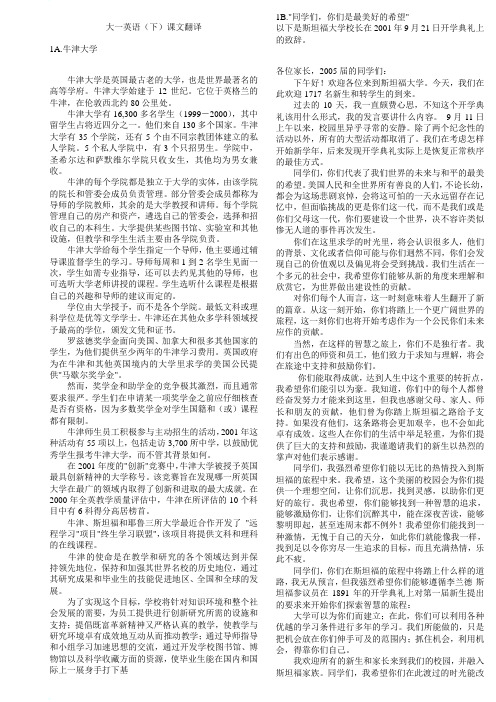
大一英语(下)课文翻译1A.牛津大学--------------------------------------------------------------------------------牛津大学是英国最古老的大学,也是世界最著名的高等学府。
牛津大学始建于12世纪。
它位于英格兰的牛津,在伦敦西北约80公里处。
牛津大学有16,300多名学生(1999-2000),其中留学生占将近四分之一。
他们来自130多个国家。
牛津大学有35个学院,还有5个由不同宗教团体建立的私人学院。
5个私人学院中,有3个只招男生。
学院中,圣希尔达和萨默维尔学院只收女生,其他均为男女兼收。
牛津的每个学院都是独立于大学的实体,由该学院的院长和管委会成员负责管理。
部分管委会成员都称为导师的学院教师,其余的是大学教授和讲师。
每个学院管理自己的房产和资产,遴选自己的管委会,选择和招收自己的本科生。
大学提供某些图书馆、实验室和其他设施,但教学和学生生活主要由各学院负责。
牛津大学给每个学生指定一个导师,他主要通过辅导课监督学生的学习。
导师每周和1到2名学生见面一次,学生如需专业指导,还可以去约见其他的导师,也可选听大学老师讲授的课程。
学生选听什么课程是根据自己的兴趣和导师的建议而定的。
学位由大学授予,而不是各个学院。
最低文科或理科学位是优等文学学士。
牛津还在其他众多学科领域授予最高的学位,颁发文凭和证书。
罗兹德奖学金面向美国、加拿大和很多其他国家的学生,为他们提供至少两年的牛津学习费用。
英国政府为在牛津和其他英国境内的大学里求学的美国公民提供"马歇尔奖学金"。
然而,奖学金和助学金的竞争极其激烈,而且通常要求很严。
学生们在申请某一项奖学金之前应仔细核查是否有资格,因为多数奖学金对学生国籍和(或)课程都有限制。
牛津师生员工积极参与主动招生的活动,2001年这种活动有55项以上,包括走访3,700所中学,以鼓励优秀学生报考牛津大学,而不管其背景如何。
大一下学期英语翻译

第一单元汉翻英1. 她连水都不愿喝一口,更别提留下来吃饭了。
(much less)Suggested answer: She wouldn't take a drink, much less would she stay for dinner.2. 他认为我在对他说谎,但实际上我讲的是实话。
(whereas)Suggested answer: He thought I was lying to him, whereas I was telling the truth.3. 这个星期你每天都迟到,对此你怎么解释? (account for)Suggested answer: How do you account for the fact that you have been late every day this week?4. 他们利润增长的部分原因是采用了新的市场策略。
(due to)Suggested answer: The increase in their profits is due partly to their new market strategy.5. 这样的措施很可能会带来工作效率的提高。
(result in)Suggested answer: Such measures are likely to result in the improvement of work efficiency.6. 我们已经在这个项目上投入了大量时间和精力,所以我们只能继续。
(pour into) Suggested answer: We have already poured a lot of time and energy into the project, so we have to carry on英翻汉1. I don't think that he would commit robbery, much less would he commit violent robbery.Suggested answer: 我认为他不会抢劫,更不用说暴力抢劫了。
大一下英语考试翻译题与答案
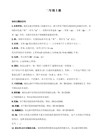
2.Mike didn't come to the party last night, nor did he call me to give an explanation.
6.They always lean on us whenever they are in trouble.
6-1 就像机器需要经常运转一样,身体也需要经常锻炼。
2 在美国学习时,他学会了弹钢琴。
3 令我们失望的是,他拒绝了我们的邀请。
4 真实情况是,不管是好是坏,随着新科技的进步,世界发生了变化。
6 教师首先要考虑的事情之一是唤起学生的兴趣,激发他们的创造性。
1. At the meeting they discussed, among other things, the present economic situation.
2. The more I learned about the nature, the more absorbed I became in its mystery.
5 我班里的大多数女生在被要求回答问题时都似乎感到不自在。
6 当地政府负责运动会的安全。
1. (Just) as a machine needs regular running, so does the body need regular exercise.
2. He learned to play the piano while studying in the United States.
大一第二学期英语英汉互译
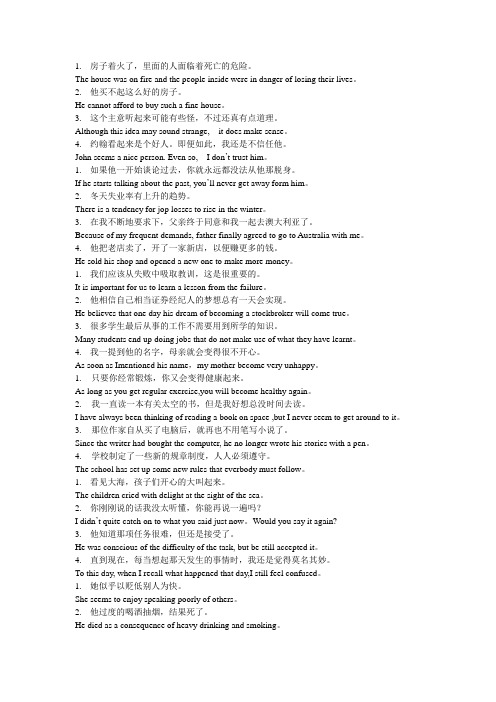
1.房子着火了,里面的人面临着死亡的危险。
The house was on fire and the people inside were in danger of losing their lives。
2.他买不起这么好的房子。
He cannot afford to buy such a fine house。
3.这个主意听起来可能有些怪,不过还真有点道理。
Although this idea may sound strange, it does make sense。
4.约翰看起来是个好人。
即便如此,我还是不信任他。
John seems a nice person. Even so, I don’t trust him。
1.如果他一开始谈论过去,你就永远都没法从他那脱身。
If he starts talking about the past, you’ll never get away form him。
2.冬天失业率有上升的趋势。
There is a tendency for jop losses to rise in the winter。
3.在我不断地要求下,父亲终于同意和我一起去澳大利亚了。
Because of my frequent demands, father finally agreed to go to Australia with me。
4.他把老店卖了,开了一家新店,以便赚更多的钱。
He sold his shop and opened a new one to make more money。
1.我们应该从失败中吸取教训,这是很重要的。
It is important for us to learn a lesson from the failure。
2.他相信自己相当证券经纪人的梦想总有一天会实现。
He believes that one day his dream of becoming a stockbroker will come true。
英语 大一下学期英译汉汉译英

一政府采取的一系列措施不但没有化解矛盾,反倒激起更多的暴力冲突。
反对党联合工会发动了一次大罢工,最终导致政府的垮台。
Instead of resolving contradictions, the series of measures taken by the government gave rise to more violent clashes. The Opposition formed an alliance with the trade unions and launched a general strike, which ultimately brought about the downfall of the government.如今,大学与现实世界的距离越来越小,学生也变得越来越实际。
从前,大学是一个象牙塔,学者追求的是学问本身而不是把学问作为达到目的的手段,但这样的时代已经一去不复返了。
Nowadays, the gap between the university and the real world is shrinking and students are becoming more and more practical. Gone are the days when the university was an ivory tower in which scholars pursued knowledge as an end rather than a means to an end.我从未指望靠上课来学好这门课。
但我确实去听课,因为在课上我能了解这门课的重点,学会如何组织材料、如何推理。
I never hoped to learn the subject well by attending those lectures. But I did go to lectures, for it was the place where I could get theimportant points of the course and learn how to organize materials and how to reason.我一直想方设法解决这个难题,但就是找不到满意的答案。
武汉纺织大学大一下学期英语期末考试新视野第二册翻译原题及答案

武汉纺织大学大一下学期英语期末考试新视野第二册翻译原题及答案Unit4(原题)1. 有朋自远方来,不亦乐乎 (Use "it" as the formal subject) 2. 不管黑猫白猫,能抓住老鼠就是好猫。
(as long as) 3. 你必须明天上午十点之前把那笔钱还给我。
(without fail) 4. 请允许我参加这个项目,我对这个项目非常感兴趣。
(more than + adjective) 5. 人人都知道他比较特殊:他来去随意。
(be free to do sth.) 6. 看她脸上不悦的神色,我觉得她似乎有什么话想跟我说。
(feel as though) 1. It is getting harder these days for a man with only a secondary education toget a good job. 2. As long as the green hills last, there'll aways be woodto burn. 3. If you are not satisfied with your purchase, we will be more than happy to give your money back to you. 4. We are thankful for the beauty ofthis great land, which has welcomed so many to its shores across the years. 5.To the teacher's surprise, no one volunteered for the position of monitor. 6. The dog continued to wait for its master at the train station without fail untilits own death two years later.--------------------------------------------------------------------------------(答案)[1. It is a great pleasure to meet friends from a far.2. It doesn't matter whether the cat is black or white as long asit catches mice.3. You must let me have the money back without fail by ten o'clock tomorrow morning.4. Allow me to take part in this project: I ammore than a little interested in it. 5. Everyone knows that he is special: He is free to come and go as he pleases.6. Watching the unhappy look on her face, I felt as though she wished to say something to me.1. 现如今,仅仅受过中等教育的人要想找份好工作越来越难了。
大一英语期末复习——英译汉
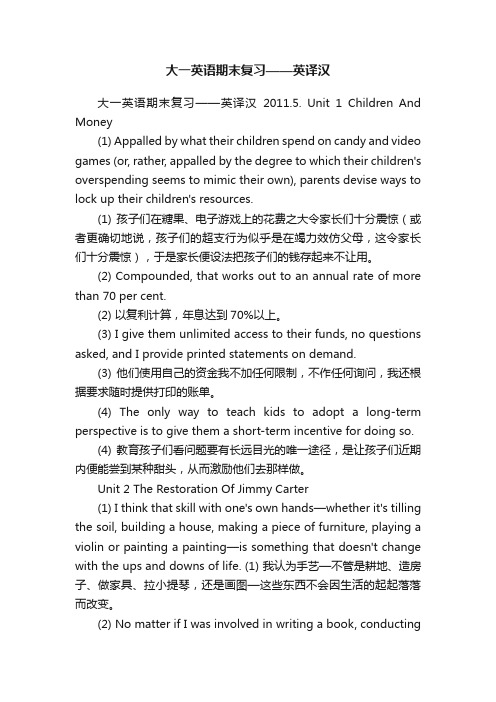
大一英语期末复习——英译汉大一英语期末复习——英译汉2011.5. Unit 1 Children And Money(1) Appalled by what their children spend on candy and video games (or, rather, appalled by the degree to which their children's overspending seems to mimic their own), parents devise ways to lock up their children's resources.(1) 孩子们在糖果、电子游戏上的花费之大令家长们十分震惊(或者更确切地说,孩子们的超支行为似乎是在竭力效仿父母,这令家长们十分震惊),于是家长便设法把孩子们的钱存起来不让用。
(2) Compounded, that works out to an annual rate of more than 70 per cent.(2) 以复利计算,年息达到70%以上。
(3) I give them unlimited access to their funds, no questions asked, and I provide printed statements on demand.(3) 他们使用自己的资金我不加任何限制,不作任何询问,我还根据要求随时提供打印的账单。
(4) The only way to teach kids to adopt a long-term perspective is to give them a short-term incentive for doing so.(4) 教育孩子们看问题要有长远目光的唯一途径,是让孩子们近期内便能尝到某种甜头,从而激励他们去那样做。
Unit 2 The Restoration Of Jimmy Carter(1) I think that skill with one's own hands—whether it's tilling the soil, building a house, making a piece of furniture, playing a violin or painting a painting—is something that doesn't change with the ups and downs of life. (1) 我认为手艺—不管是耕地、造房子、做家具、拉小提琴,还是画图—这些东西不会因生活的起起落落而改变。
大学英语期末考试翻译
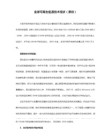
Unit8.
para16.
但是赞成全面教育的最重要的理由是,在学习世世代代积累起来的知识的同时,我们也提高了自己的道德感。最近我看了一幅漫画,描述了几个商人坐在会议桌周围,看上去困惑不解的样子。其中的一个正通过内部通话设备讲话:“巴克斯特小姐,”他说,“是否可以请您叫一个能明辨是非的人来?”
Unit6.
para8.
虽然你父母很可能想让你的名字伴随你一生,但记住,他们选这个名字的时候几乎还没有见到你呢。而且,他们在选名字时所看重的希望和梦想也许并不渡河你的希望和梦想。如果你的名字看上去已不再适合你,不要苦恼;你不必一辈子用这个名字。影星们就经常改名,下点决心,你也可以这样做。
Thought your parents probably meant your name to last a lifetime, remenber that when they picked it they'd hardly met you, and the hopes and dreams they valued when they chose it may not match yours. If your name no longer seems to fit you, don't despair; you aren't stuck with the label. Movie stars regularly change their names, and with some determination, you can, too.
Unit7.
para17.
“把它们记在一张可以随身携带的卡片上,需要的时候看看。既然我们无法让一天又26个小时,我们就得确定先做哪些事情。”
- 1、下载文档前请自行甄别文档内容的完整性,平台不提供额外的编辑、内容补充、找答案等附加服务。
- 2、"仅部分预览"的文档,不可在线预览部分如存在完整性等问题,可反馈申请退款(可完整预览的文档不适用该条件!)。
- 3、如文档侵犯您的权益,请联系客服反馈,我们会尽快为您处理(人工客服工作时间:9:00-18:30)。
Filial piety is the basic code of ethics in the ancient Chinese society. Chinese people consider filial piety as the essence of a person’s integrity, family harmony, and the nation’s well-being. With filial piety being the core of Confucian ethics, it has been the moral standard for the Chinese society to maintain the family relationship for thousands of years. It’s undoubtedly a traditional Chinese virtue. The culture of filial piety is a complex concept, rich in content and wide in range. It includes not only cultural ideas but also institutional etiquette. Generally speaking, it refers to the obligation of children to their parents required by the society, including respect, care, support for the elderly and so forth. Filial piety is fundamental to the ancient “Oriental civilization”.The Silk Road is a traffic route in the ancient times connecting China and Eurasia. This trade route focuses on the trade of silk, hence the name “the Silk Road”.As an international trade channel and a bridge of cultural exchanges, the Silk Road effectively improved the economic and cultural exchanges and development between the East and the West, exerting a profound impact on the progress of the world civilization. Nowadays, under the new historical circumstances, our country proposes the strategy of “One Belt, One Road”( namely the Silk Road Economic Belt and the 21st-century Maritime Silk Road).The strategy of “One Belt, One Road”focuses on cooperation and mutual benefits, emphasizing mutual benefits, win-win, as well as common development of the related countries. Once proposed, the strategy has received positive responses from the related countries along the road.National Happiness Index(NHI)is an index that measures how happy people are .It is also a tool that measures the levels of economic development and people’s livelihood and happiness in a country or region. With the fast growth of Chinese economy, the Chinese government has been playing more and more attention to people’s living quality and the increase of happiness index. The government stresses improvement of its people’s livelihood, striving to improve their economic conditions and meet their growing material and cultural needs. Currently, the Chinese government advocates the unleashing of more reform dividends, with the aim of offering more real benefits to its people. All these measures will combine to effectively increase the NHI of our people.China is home to silk, thereby having a variety of arts related to silk, one of which is embroidery. Embroidery, with at least two or three thousand years of history, is one of the Chinese traditional folk arts and crafts. Since most embroiderers are women, it's also called "women's needlework". Embroidery has been much-loved by the Chinese people. It can be used to beautify clothing and things. For example, clothes, quilts, pillowcases etc. can be embroidered with beautiful designs, or a piece of embroidery can be made for a special ornament. There are four most famous types of embroidery in China: Suxiu from Suzhou, Yuexiu from Guangdong, Xiangxiu from Hunan, and Suxiu from Sichuan, each having its own style and theme. Among the four, Suzhou embroidery has enjoyed the highest reputation.Many historical records indicate that gunpowder first appeared before the Tang Dynasty, but the military applications of gunpowder began in the Tang Dynasty. Explosive bombs filled with gunpowder and fired from catapults were used in war. During the Song and Yuan Dynasties, the military applications of gunpowder became common and some weapons like “fire cannon”. “fire arrow” and “fire bomb” were introduced. In the Yuan Dynasty, the method of gunpowder-making was introduced to Europe, and then gunpowder became an effective weapon on the battlefield.Confucius was a famous thinker, statesman and educator at the end of the Spring and Autumn Period. The Analects of Confucius is the main source of knowledge about Confucius. As the founder of Confucianism, Confucius established a basic code of Confucian ethics(道德规范).The core of his thoughts is benevolence; its form of expression is etiquette. His thoughts had far-reaching influence on Chinese traditional culture and belief.The philosophical sayings of Confucius are still shining brilliantly today, for instance, "He who by reviewing the old can gain knowledge of the new and is fit to be a teacher." So, he is considered the greatest sage in Chinese history(throughout Chinese history).As the end of the 20th century, the Tang Suit began entering the fashion industry. Like the cheongsam, the Tang Suit is another representative of Chinese national costumes. It delivered this name not only because itsdesigners got inspirations from the suits of the Tang Dynasty, but also because the Tang Dynasty was a prosperous period. Clothes that embody a Chinese flavor are therefore collectively referred to as Tang Suits. China’s impact on the global fashion industry was demonstrated during the Ninth Asia-Pacific Economic Cooperation Summit(APEC) in 2001,when all the menbers attending the summit wore Tang Suits.The origins of traditional Chinese medicine (TCM) can be traced to Shen Nong, a mythological figure from about 5,000 years ago, who sampled and distinguished many kinds of herbs.As a system of medical theory evolved from long-term medical practice, The Yellow Emperor's Canon of Medicine carries the experiences and knowledge of the ancient Chinese people fighting against diseases.TCM holds that a patient's condition refelects the interaction of five elements of nature: wood, fire, earth, metal and water.Chinese people generally perceive TCM as more effective for preventing disease and curing chronic illness.。
